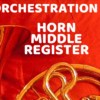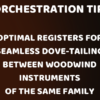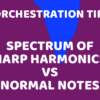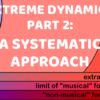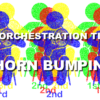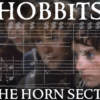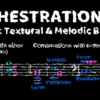This is a special birthday post from your orchestration teacher at Orchestration Online. A couple of years ago, I uploaded a video about turning 50, and charted my own development as a composer. Today, I want to contemplate the punctuation of decades. Where were you musically a decade ago, and a decade before that?
For me, the decades are somewhat arbitrary, but still worth examining as an intellectual and artistic exercise. At 2 years old, I discovered music as a thing. I was becoming verbal, and was able to distinguish between the concept of music and the sonic wallpaper of classical, folk, blues, and rock that coated the inside of my house. That element in life had a name, and the process of absorbing it had to do with putting little discs of plastic on a rotating metal plate, then listening to sounds coming out of an ornately carved box. The legs propped the whole contraption just high enough to crawl under, and was a safe, cosy spot to listen to the thunderings of a symphony.
By 12 years old, I had moved house 20 times, changed piano teachers 5 times, learned to score-read, bought my own music, and decided that music was my main interest. I was just learning to play string instruments, attending performances of our local youth orchestra, and playing in the school orchestra. It was fun learning about it from the inside, and taking a much-needed break from piano playing. It’s always a heavy thing when your piano teacher starts going out with your big sister, and a good enough excuse to let things rest for a while. By the end of my twelfth year, I settled on composing as a career, and received a copy of Piston’s Orchestration for my next birthday, which was a watershed for me.
By 22, I’d changed musical courses many times, but always maintained the notion that I was a composer. I’d been in and out of working bands, helping to pay the rent for my down-on-our-luck family. But I’d also seen a grimmer side of employment as a restaurant worker: employers who exploited employees, speculated with company payroll on the stock market, and abused drugs in ways that increased their sense of paranoia and hostility. By my 21st birthday, I’d had enough – all future income would have to come directly from my music. So I was getting started as a music teacher, carrying on work in bar bands, and starting on a path with commissions that would eventually lead to a career.
By 32, I’d been a family man for most of a decade, raised some adolescent stepdaughters, built a house, and learned how to be a big fish in a small town. There was a certain easiness to it on one hand: if one was determined to engage in a musical enterprise, one would get recognition and attendance – but no follow-through. Orchestrally, I’d composed several hours worth of music, and even had about half an hour of it performed here and there. Though I was doing a lot for myself personally, shaping some of my ideas about the artistic process, orchestration, aesthetics, and so on, I had done very little for my career. There was a blissful sense of inertia on the surface, despite all the inner growth.
By 42, I’d left the little town, changed partners, and become immersed in the endless cycle of creative projects. I was living in San Francisco, had been commissioned regularly, and also been involved in helping others to be commissioned. I’d started reviewing and interviewing contemporary musicians, and writing about music from a cultural and historical perspective. But still, my teaching was a mighty engine that sponsored all these activities. Tending that machine afforded plenty of time and resources for developing my career, and I went for it with a will. And finally, with a great deal of searching out of opportunities and developing connections, my orchestral compositions were becoming performed and commissioned – enough upon which to build a career as an orchestrator.
Which leads to today, age 52. Over the past decade, I’ve moved to a new country, opened and closed a performing arts academy for teens (both opened and closed with a bang), and developed my connections to the point where the huge bulk of my livelihood is directly related to activities as an orchestrator. I credit my friends, family, culture, and so on, but really it’s mostly the internet that’s made this possible. Getting out there and helping other musicians has been the foundation of a lot of what I do. It’s great to be able to think about music all day long, and encourage it in others, bring it to life in my home and work, and see it shape the rest of the world. And I’m so grateful to all of my colleagues, friends, and connections on the internet for being there, giving me a platform from which to communicate, and offering something irresistible to my DNA: the opportunity to help you out if you need it when I’ve got the time. That is priceless. Thanks to you all!
Yours with great affection and fraternity,
Thomas Goss
15 July 2014, Wellington, New Zealand

